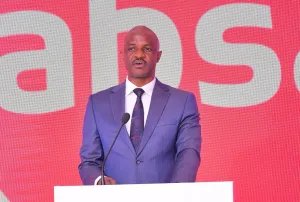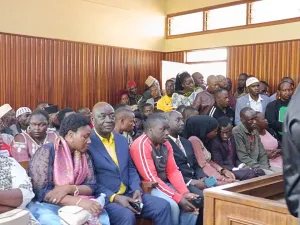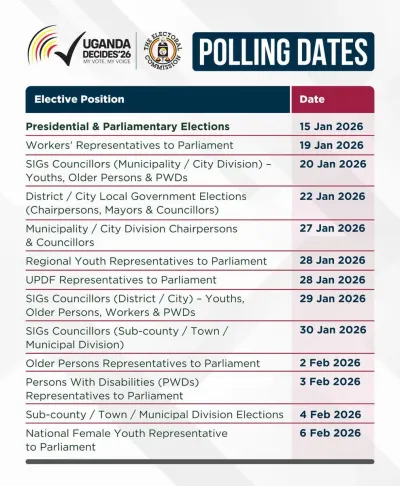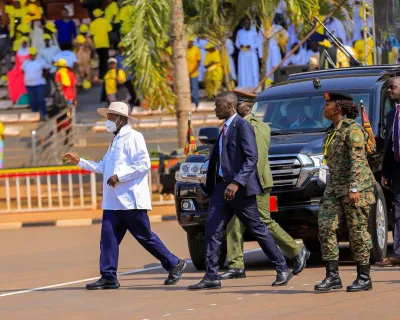
Mr. President, if by sacking Mbabazi you thought you would calm the degenerating political situation ahead of 2016, you might need to sack more people in strategic positions!
On November 13, 2014, we woke up to the news that Bank of Uganda Governor Emmanuel Tumusiime-Mutebile had said he was misled by the government into funding 2011 elections. Mutebile reportedly said, “You should remember that the economy of this country was thrown into total chaos after the last elections, allegedly because central bank had printed a lot of money to finance the elections.”
He said that although the Bank of Uganda (BOU) did not print money directly, he passed money on to your government through other means, and he vowed never to do such a mistake again.
Mr. President, this is not the first time our Central Bank Governor is revealing critical information. In June 2011, he told Financial Times’ Katrina Manson that your government had raided the Treasury and took off with $720m (about two months of the country’s reserves) to purchase fighter jets, an allegation that caused irreparable damage to the economy.
Speculators took advantage of Mutebile’s utterances and drove the shilling to a record low. At the end of 2011, Bloomberg News agency ranked Ugandan shilling as the World’s worst performing currency. A dollar was purchasing Ushs.2800 in November 2011. Although BOU has been performing some emergency surgery on the currency in the last two years, it has never fully recovered. To date, the shilling is still limping.
I wrote in these very pages that it is actually the Bank of Uganda’s illegal actions and the subsequent media utterances by Mr. Mutebile that accelerated the post-2011 election inflationary pressures. At the time, both the BOU and your government attributed the then galloping inflation (which peaked at 30.4% in October 2011) to supply-side rigidities, particularly food shortages due to drought and floods, and high fuel prices following the drop in supply of oil as a result of the geopolitical tensions (Arab spring) in North Africa and the Middle East.
OK. BOU “printed” money!
Now, Mutebile is back. And this time he sounds like a man on a mission to erase any doubts that were remaining among some people that indeed NRM used State funds to run its 2011 campaigns. Although he tried to deny that the BOU printed money directly to facilitate the NRM’s victory, his explanation can only appeal those who have never attended any class of basic macroeconomics.
Anyone who has ever been in an economics class, in a good school, knows that government may borrow from the central bank and cause money supply to increase even when the central bank does not directly print money. For starters this is how it works: Bank of Uganda credits government’s account with the value of unsold stock of bonds, effectively as an overdraft facility. The government makes cheques payable to individuals and firms that it may want to pay.
The recipients of those cheques (in this case, perhaps the campaign managers at NRM Secretariat some ministers who in 2011 were found with sacks of money) pay them into their accounts at commercial banks, which in turn present them to BOU for payment. The BOU credits the commercial banks’ accounts (held at the BOU) with the value of those cheques. Cash reserves of commercial banks rise which allows “multiple expansions” of deposits (something referred to as credit creation). It also allows the granting of loans and overdrafts to the customers of the bank.
This is what people mean when they tell Mutebile and his team at BOU that they “printed” more money to finance the 2011 elections. It may be the fact that the BOU did not run to its printers to spin out new currency notes (which by the way is also very difficult to rule out now), but the effect is the same since the value of bank deposits is part of the conventional definition of money supply. This is what monetarists at central banks love to confuse non-monetarists with as M2 (or broad money).
The bottom line is that money supply, deliberately “created” to enable the incumbent win, increased in the months heading to the 2011 polls. Information at the IMF shows that the massive “quantitative easing” by the BOU increased money supply by 36% by November 2011.
Mutebile won awards!
This caused inflation to rise from 6% in February 2011 to 11% in March, then to 14% in April, and finally peaking at 30% in October the same year. In turn, this reduced the real purchasing power of the shilling, pushing the domestic prices up, and also crowding out private investment due to the high interest rates charged on bank loans.
People lost, and continue to lose, their homes and other properties to banks, because the inflation caused by these illegal actions by the BOU and the NRM government forced banks to raise lending rates which made people fail to clear their loan liabilities.
The distortions caused by the above actions also increased the unemployment rate. How? Following the increased inflationary pressures, BOU panicked and tightened its monetary policy in a bizarre manner. Information from the IMF indicates that the BOU increased short-term interest rates by 700 basis points. You can search the world but you might not find a country where interest rates have ever been raised by that magnitude in such a short time.
Of course this “mechanical engineering” of the economy by the BOU eventually brought, not only the money growth and inflation to a standstill, but also growth, incomes of people, jobs, and other important variables stagnated. But because inflation had reduced, Mutebile won the award of best central bank governor in Africa! I proposed, exactly a year ago, in these very pages that he should be put in the Guinness book of world records. Mutebile is the first man to win an award for solving a problem he created!
Yet I doubt that he actually solved the problem. Millions of youth that get out of university cannot find decent jobs in the formal sector, mainly because businesses are finding it hard to access money in banks to expand and create more jobs. The shilling has not recovered, and perhaps it might never recover unless another currency reform (similar to the 1987, when two zeroes were knocked off the currency) is carried out again.
Surrounded by “Mbabazi clique”
Secondly, although inflation reduced to the current average of about 2%, prices for goods and services have not reduced, and will never reduce back to their original levels. Neoclassical economics teaches us that prices are sticky downward. Once they rise they don’t reduce back to their original levels. This implies that the cost of living for Ugandans will, for the foreseeable future, remain high, unless the BOU does the unlikely scenario of allowing inflation to reduce into negative rates. Ugandans should thus tighten their belts for another couple of years of economic hardship, initiated by the reckless “financial gerrymandering” instituted by Mutebile’s BOU.
Lest I forget! The reason I picked pen and paper this week was to ask; what was the intention of Mutebile’s current revelations? The last time he let out government secrets in 2011 to the Financial Times he wanted to get the blame for the then fast-deteriorating economic situation off his sleeves, to the attention of his “friends” at the IMF and the World Bank.
What is the plot this time round? My nosy mind points at the ongoing big battle in town. The battle between you, Mr. President, and your former Prime Minister and close ally, Amama Mbabazi. Being close buddies with Mbabazi, Mutebile could be reading much into the unlikely event that he also faces the appointing authority’s sword sooner or later. In the latest revelation he could be trying to preempt his own sacking.
Alternatively, he could be out early enough to fight for his friend. Someone recently told me that Bakiga are like ants; you touch one and the entire group gets in action to sting you. Mr. President, if by sacking Mbabazi you thought you would calm the degenerating political situation ahead of 2016, you might need to sack more people in strategic positions!
The pity with you is that you seem, back in the day, to have given Mbabazi a lot of power, and he used it to optimal levels and appointed quite a good number of his allies in key positions. To make matters worse, you seem to have no idea how to disentangle yourself from this “Mbabazi clique.” It is everywhere; in cabinet, in the economy, in the military and security, in the media, and I wouldn’t be surprised if it extended to your own State House!
Therefore, getting rid of this clique literally means getting rid of the entire government. Recently you told the BBC that let everyone watch as you deal with the NRM matters. We are watching sir.













Ramathan Ggoobi
Ramathan Ggoobi is Policy Analyst, and Researcher. He lecturers economics at Makerere University Business School (MUBS) and has co-authored several studies on Uganda's economy. For the past ten years, he has published a weekly column 'Are You Listening Mr. President' in The Sunrise Newspaper, Uganda's Leading Weekly
Leave a Comment
Your email address will not be published.